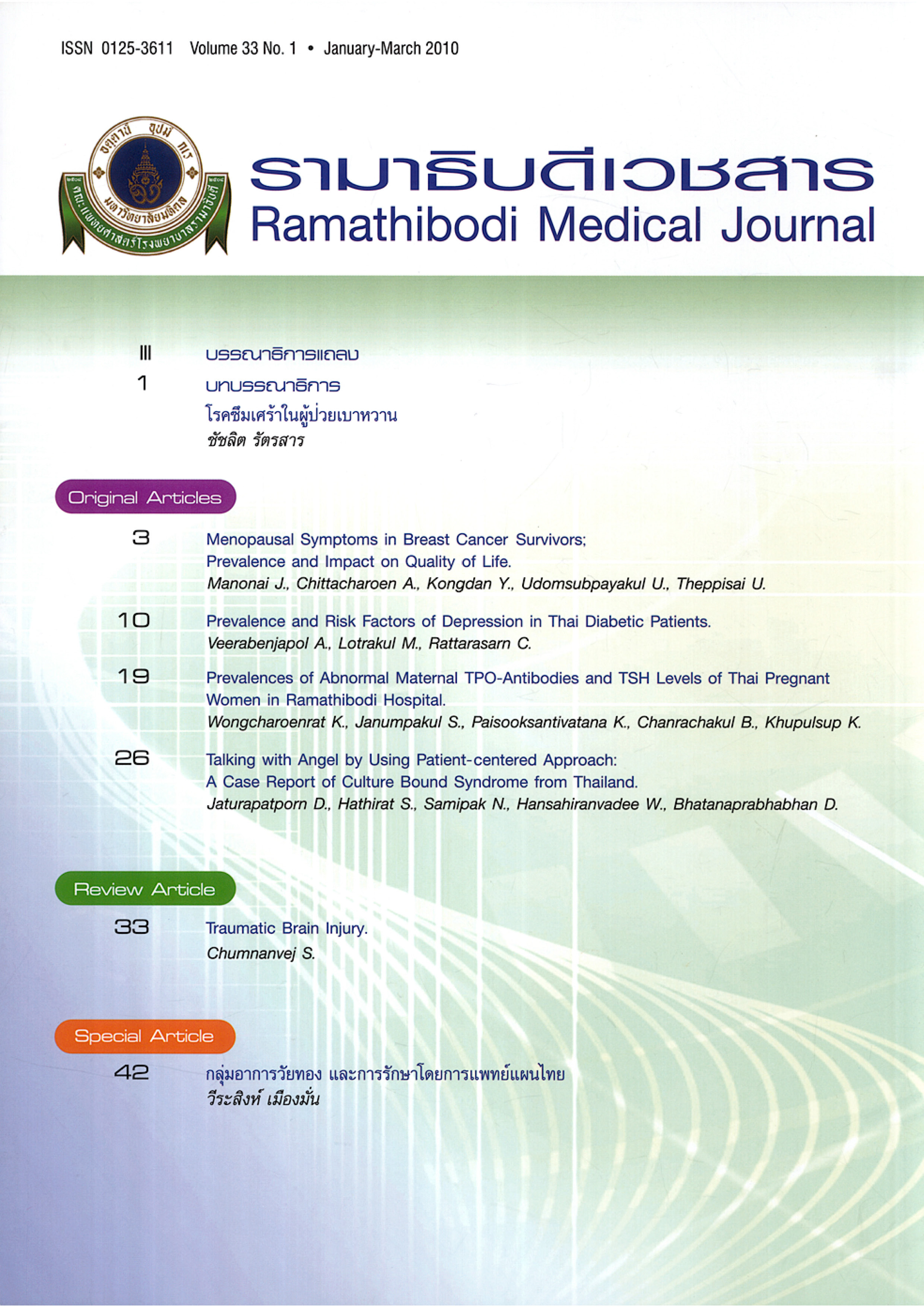Prevalence and Risk Factors of Depression in Thai Diabetic Patients
Keywords:
Depression, Diabetes mellitus, Risk factors, Prevalence, ScreeningAbstract
Objective: The goal of this study was to determine the prevalence of depression in Thai diabetic patients and to examine clinical characteristics of diabetes that are associated with depression.
Method: Diabetic patients from diabetic clinical of Ramathibodi hospital who had no know history of depression were studied. The Thai version of the Patient Health Questionnaire (PHQ-9) was used to screen for depression. Clinical characteristics and laboratory data of patients were obtained from medical records. Multivariate logistic regression was used to determine the independent risk factors depression.
Results: Three-hundred eighty-five individuals were participated. The prevalence of depression was 15.8%. By univariate analysis, risk factors that were associated with depression included education less than primary school, treatment with insulin and poor glycemic control (HbA1C 8%). However, with multivariate logistic regression analysis, only education less than primary school and treatment with insulin were two significant risk factors associated with depression in diabetic patients.
Conclusion: The prevalence of depression among diabetic patients in diabetic clinic of Ramathibodi hospital was unexpectedly high. Education less than primary school and treatment with insulin were the independent risk factors of depression in Thai diabetic patients.
References
Gregg EW, Beckles GL, Williamson DF, Leveille SG, Langlois JA, Engelgau MM, et al. Diabetes and physical disability among older U.S. adults. Diabetes Care. 2000;23(9):1272-7. doi:10.2337/diacare.23.9.1272.
Geerlings SW, Beekman AT, Deeg DJ, Van Tilburg W. Physical health and the onset and persistence of depression in older adults: an eight-wave prospective community-based study. Psychol Med. 2000;30(2):369-80.
Krishnan KR. Biological risk factors in late life depression. Biol Psychiatry. 2002;52(3):185-92. doi:10.1016/S0006-3223(02)01349-5.
Lustman PJ, Anderson RJ, Freedland KE, de Groot M, Carney RM, Clouse RE. Depression and poor glycemic control: a meta-analytic review of the literature. Diabetes Care. 2000;23(7):934-42. doi:10.2337/diacare.23.7.934.
Turkington RW. Depression masquerading as diabetic neuropathy. JAMA. 1980;243(11):1147-50. doi:10.1001/jama.1980.03300370021019.
de Groot M, Anderson R, Freedland KE, Clouse RE, Lustman PJ. Association of depression and diabetes complications: a meta-analysis. Psychosom Med. 2001;63(4):619-30.
Ciechanowski PS, Katon WJ, Russo JE. Depression and diabetes: impact of depressive symptoms on adherence, function, and costs. Arch Intern Med. 2000;160(21):3278-85. doi:10.1001/archinte.160.21.3278.
Katon WJ1, Rutter C, Simon G, Lin EH, Ludman E, Ciechanowski P, et al. The association of comorbid depression with mortality in patients with type 2 diabetes. Diabetes Care. 2005;28(11):2668-72. doi:10.2337/diacare.28.11.2668.
Katon W, von Korff M, Ciechanowski P, Russo J, Lin E, Simon G, et al. Behavioral and clinical factors associated with depression among individuals with diabetes. Diabetes Care. 2004;27(4):914-20. doi:10.2337/diacare.27.4.914.
Egede LE, Zheng D. Independent factors associated with major depressive disorder in a national sample of individuals with diabetes. Diabetes Care. 2003;26(1):104-11. doi:10.2337/diacare.26.1.104.
Lustman PJ, Freedland KE, Griffith LS, Clouse RE. Fluoxetine for depression in diabetes: a randomized double-blind placebo-controlled trial. Diabetes Care. 2000;23(5):618-23. doi:10.2337/diacare.23.5.618.
Lustman PJ, Griffith LS, Clouse RE, Freedland KE, Eisen SA, Rubin EH, et al. Effects of nortriptyline on depression and glycemic control in diabetes: results of a double-blind, placebo-controlled trial. Psychosom Med. 1997;59(3):241-50.
Anderson RJ, Freedland KE, Clouse RE, Lustman PJ. The prevalence of comorbid depression in adults with diabetes: a meta-analysis. Diabetes Care. 2001;24(6):1069-78. doi:10.2337/diacare.24.6.1069.
Noh JH, Park JK, Lee HJ, Kwon SK, Lee SH, Park JH, et al. Depressive symptoms of type 2 diabetics treated with insulin compared to diabetics taking oral anti-diabetic drugs: a Korean study. Diabetes Res Clin Pract. 2005;69(3):243-8. doi:10.1016/j.diabres.2004.10.009.
Zahid N, Asghar S, Claussen B, Hussain A. Depression and diabetes in a rural community in Pakistan. Diabetes Res Clin Pract. 2008;79(1):124-7. doi:10.1016/j.diabres.2007.07.006.
Khamseh ME, Baradaran HR, Rajabali H. Depression and diabetes in Iranian patients: a comparative study. Int J Psychiatry Med. 2007;37(1):81-6. doi:10.2190/FP64-82V3-1741-842V.
Chou KL, Chi I. Prevalence of depression among elderly Chinese with diabetes. Int J Geriatr Psychiatry. 2005;20(6):570-5. doi:10.1002/gps.1328.
Siriwanarangsun P, Kongsuk T, Siriwan Y, Charassing A, Bualek N, Ruchirachakorn S, et al. The 2003 National epidemiologic survey on mental health in Thailand. Bangkok: Department of Mental Health, Ministry of Public Health; 2004.
Spitzer RL, Kroenke K, Williams JB. Validation and utility of a self-report version of PRIME-MD: the PHQ primary care study. Primary Care Evaluation of Mental Disorders. Patient Health Questionnaire. JAMA. 1999;282(18):1737-44. doi:10.1001/jama.282.18.1737.
Lotrakul M, Sumrithe S, Saipanish R. Reliability and validity of the Thai version of the PHQ-9. BMC Psychiatry. 2008;8:46. doi:10.1186/1471-244X-8-46.













